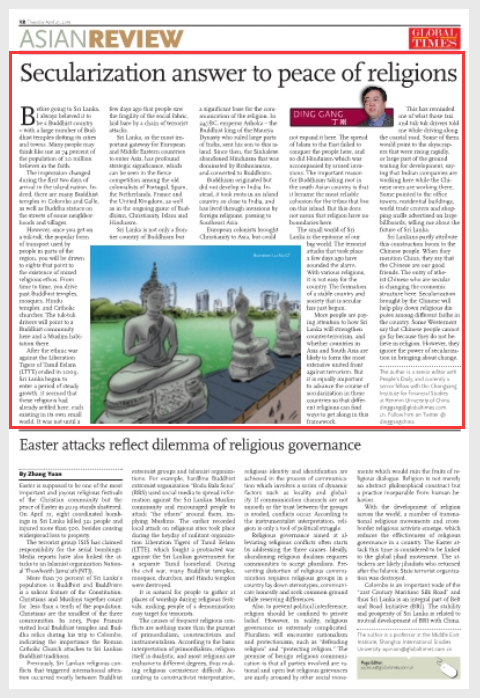Major Power Relations
Your Present Location: PROGRAMS> Major Power RelationsDing Gang: Secularization answer to peace of religions
By Ding Gang Source: Global Times Published: 2019-4-25
Before going to Sri Lanka, I always believed it to be a Buddhist country - with a large number of Buddhist temples dotting its cities and towns. Many people may think like me as 74 percent of the population of 20 million believes in the faith.

The impression changed during the first two days of arrival in the island nation. Indeed, there are many Buddhist temples in Colombo and Galle, as well as Buddha statues on the streets of some neighborhoods and villages.
However, once you get on a tuk-tuk, the popular form of transport used by people in parts of the region, you will be drawn to sights that point to the existence of mixed religious ethos. From time to time, you drive past Buddhist temples, mosques, Hindu temples, and Catholic churches. The tuk-tuk drivers will point to a Buddhist community here and a Muslim habitation there.
After the ethnic war against the Liberation Tigers of Tamil Eelam (LTTE) ended in 2009, Sri Lanka began to enter a period of steady growth. It seemed that these religions had already settled here, each existing in its own small world. It was not until a few days ago that people saw the fragility of the social fabric, laid bare by a chain of terrorist attacks.
Sri Lanka, as the most important gateway for European and Middle Eastern countries to enter Asia, has profound strategic significance, which can be seen in the fierce competition among the old colonialists of Portugal, Spain, the Netherlands, France and the United Kingdom, as well as in the ongoing game of Buddhism, Christianity, Islam and Hinduism.
Sri Lanka is not only a frontier country of Buddhism but a significant base for the communication of the religion. In 247BC, emperor Ashoka - the Buddhist king of the Maurya Dynasty who ruled large parts of India, sent his son to this island. Since then, the Sinhalese abandoned Hinduism that was dominated by Brahmanism, and converted to Buddhism.
Buddhism originated but did not develop in India. Instead, it took roots in an island country so close to India, and has lived through invasions by foreign religions, passing to Southeast Asia.
European colonists brought Christianity to Asia, but could not expand it here. The spread of Islam to the East failed to conquer the people here, and so did Hinduism which was accompanied by armed invasions. The important reason for Buddhism taking root in the south Asian country is that it became the most reliable cohesion for the tribes that live on this island. But this does not mean that religion have no boundaries here.
The small world of Sri Lanka is the epitome of our big world. The terrorist attacks that took place a few days ago have sounded the alarm. With various religions, it is not easy for the country. The formation of a stable country and society that is secular has just begun.
More people are paying attention to how Sri Lanka will strengthen counter-terrorism, and whether countries in Asia and South Asia are likely to form the most extensive united front against terrorism. But it is equally important to advance the course of secularization in these countries so that different religions can find ways to get along in this framework.
This has reminded me of what those taxi and tuk-tuk drivers told me while driving along the coastal road. Some of them would point to the skyscrapers that were rising rapidly, or large part of the ground waiting for development, saying that Indian companies are working here while the Chinese ones are working there. Some pointed to the office towers, residential buildings, world trade centers and shopping malls advertised on large billboards, telling me about the future of Sri Lanka.
Sri Lankans partly attribute this construction boom to the Chinese people. When they mention China, they say that the Chinese are our good friends. The entry of atheist Chinese who are secular is changing the economic structure here. Secularization brought by the Chinese will help play down religious disputes among different faiths in the country. Some Westerners say that Chinese people cannot go far because they do not believe in religion. However, they ignore the power of secularization in bringing about change.
Ding Gang is a senior fellow at the Chongyang Institute for Financial Studies at Renmin University of China.























































































 京公网安备 11010802037854号
京公网安备 11010802037854号





